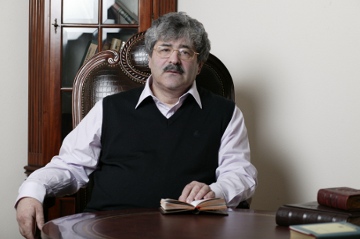
This is not a parable, it is a true story. A rich man built a temple. He did not go to the temple to pray or to repent, or for communion. Maybe he had little belief, or maybe he was a complete unbeliever, but at least he respected the faith of others: his loved ones, relatives, friends, and neighbors. They say, let the people take comfort if they believe. If he had no love for God, he was worthy of respect for his compassion for the people, and they found a grateful response in their hearts, and then, as they say - "God will kiss even the intention."
However, this is a very special case, you can even say unique, and there is no direct counterpart to it even in the Gospel parables. After completing the construction of the temple, our rich man said, "Now I have paid my dues to God".
Of course, in pagan times and in those of the Old Testament, the idea of gifts and sacrifices to God in "propitiation" was always present, but had the character of a permanent act, so to speak, eliminating the possibility to pay God once, once and for all. In medieval indulgences and payment for the sins of the sinners from the fund of certain "supererogatory merits of the saints" was perhaps the most common attitude of our rich man. However, in the first case the Catholic Church stood between the sinner and God, and the same payments were carried out with the heavens directly – online, so to speak.
The Gospel, however, tells us that "a certain Pharisee, went into the temple to pray, and said this:" God, I thank thee that I am not like other people: swindlers, the unjust, adulterers ... I fast twice a week, and I give tithes of all that I possess. "
"And the publican, standing afar off, would not even dare to lift up his eyes unto heaven, but smote upon his breast, saying," God! Be merciful to me a sinner. "But here the parallel with the Pharisee is lame. He came to the temple to pray, trying to keep to the commandments given to Moses, and so, on a personal level he was “pious ". This meant that the Pharisee abstained from many common pleasures of the time in his private and public life.
Undoubtedly, the uniqueness of our rich man was dictated by a pervading spirit of economism, which forms the current attitude of man, not only to the world we can see, but also to the world unseen.
In the first half of the twentieth century, Sergei Bulgakov drew attention to the fact that "the questions of economic existence authoritatively occupied one of the prime places in our thoughts and feelings."
However, economism can be at odds with itself. Our Russian business and entrepreneurship in the 1990s managed at an early stage to develop a new social and cultural mentality of accumulation, which had no precedent in the period of early bourgeois accumulation.
As noted by the German sociologist, historian and economist Max Weber, capitalism is initially based on a sort of penance - " the human spirit becomes a victim, in a conscious rejection of the" celebration of life. "
The Russian philosopher, Alexander Panarin, wrote: "According to Weber, it is not about the assimilation of the human machine, but about the religious methodical related to taming passions and sinful impulses.” Weber corrects Marx, when he says that the victim of these methodical acts are not proletarians, but first of all the bourgeoisie, and the greatness of this sacrifice is that it is not forced, as it is on the proletariat, but volunteered ...
What is ... the process of capitalist accumulation? According to Weber, it is "the motivated sacrifice of the bourgeois businessman who, instead of wasting and surrendering his profit based on the traditional hedonistic model of all previous ruling classes, he stores and invests."
Panarin concludes:"Today individualistic selfishness is spontaneously inclined to hedonistic consumption, and not to saving and investment."
It is worth the many TV show presenters thinking about the old question: "Why does Russia not like the rich?" Not to ask about what there is actually to like about them, because how can that be measured...
read more in our Telegram-channel https://t.me/The_International_Affairs

 19:03 19.12.2011 •
19:03 19.12.2011 •






















